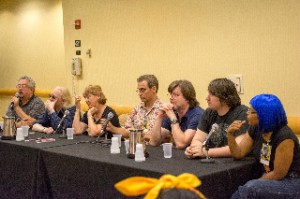This is something I’ve been doing the past couple of days, since we had a workshop on the subject at the Women Writing the West Conference.

If you’ve published anything, you should register your author page on Goodreads and keep it updated so your readers can find you. You should be able to click “I’m the author” when you search for your title on the site, but if not, just contact a librarian at the website and ask them to add your book for you.
Another good thing to do is join some groups and participate. This doesn’t mean posting “Buy My Book” comments of course. No, social media is for getting to know your readers and letting them get to know you. Find some groups that tie in with what you write and start commenting and posting without mentioning your books (unless they actually are relevant, in which case, be humble about it). Keep up with the discussions and try to post something weekly (either a comment or new topic). This shows up on your author page so your readers know you’re an active part of their favorite website.
You can add your favorite quotes to your page, too. Look down on the left and you’ll see the right section. It’s down there with your favorite authors and genres and such. There’s even a Q&A session you can sign up for, and they email you if anyone asks you something. If nobody has asked any questions yet, Goodreads has some sample questions you can answer, too.
Goodreads will also show your bookshelf and what you’re currently reading. Be sure to always have your own book(s) as “currently reading” so they show up prominently on your page. Periodically, tweak the “percentage read” bar so the books show up in your news feed as well.
A fun challenge you can sign up for is their Reading Challenge, where you determine how many books you want to read each year. Goodreads then keeps track each time you add another book, and shows your progress on your author page. It also displays reviews, so be professional and courteous at all times — as I’m sure you already are!
What other tips do you have for Goodreads?
Here’s some more information from my upcoming Social Media Panel at the Western Fictioneer’s Conference at the end of the month.
Instagram is currently the “youngster’s” hangout. with a peak age under 29. It has over 60 million users, with more women than men, and most of the users are either in school or have had some college education. The best time to post on Instagram is on Monday between 2-3pm, or after 9pm and before 8am. There really is no “worst time” to post on this site.
Here are a few tips just for writers:
- Have followers take photos of themselves reading your book
- Share photos of what you’re reading
- Share photos of what you’re working on
- Share photos of your favorite books
- Send a book traveling and have friends or family members post photos of the book in far away locations
- Follow bloggers who review books
- Follow fellow authors and see what they’re posting
Editors for Hire (Chantelle Aimee Osman)
Once you’ve written “the end,” the journey is only half over. You must put out the best book you can – if it’s not, you might sell it, but they won’t come back for more.
A clean, polished manuscript can make all the difference – a copy editor is a must if you’re self-publishing and even if you’re going the traditional route, I recommend having your first 5-6 chapters gone over by a professional.
How much editing do you need? Most professional authors might get by with only one edit. Some people need 4-5 edits.
Do a read-only edit yourself before sending it to the editor – catch major errors and over-arching story problems before you send it off for a line edit or line and content edit.
The thing everyone is looking for is your passion on the page. Never write just for a trend. Write what you love to read, what you love to write.
Know your genre – don’t write a zombie vampire YA mystery with Western overtones.
The first two and last two chapters of your book are the most important – have a hook at beginning to make them need to turn the page – no backstory.
Style issues:
- awkward phrasing, repeated phrasing
- do not try to have a unique voice – just write your way and the voice will show through
- the tighter, the better – cut unnecessary words
- preaching is a no-no
- watch for changes in tense or POV
“good dialogue is one of the most difficult and challenges a writer has”
Dialogue problems:
- fake dialogue – not using contractions, very formal, awkward
- dialogue to obviously advanced the plot “radio drama dialogue”
- forced dialogue – do your research
- too many trendy words date your work
- show, don’t tell
- make sure characters have distinct speech patterns
- Read your dialogue (and everything else) aloud
Descriptive problems:
- using the protagonist’s senses to relate information is a better way to show instead of description
- avoid general descriptions (beautiful, nice, etc)
- avoid laundry lists
- watch out for repetition – favorite phrases and images, sentence structure – “crutch words”
- combinations of words with the same meaning
- a set of fresh eyes are valuable in catching these things
- adjectives and adverbs – don’t use too many, never more than one together
- cut 10-15% of your words
- watch “to be” – try to avoid if possible (passive sentences)
- no qualifiers like very or really
- cliches (that also includes cliched descriptions and situations)
- wrong word choices (towards instead of toward, affect/effect, etc)
- watch for sentences with more than two commas – maybe two sentences instead
- now it’s one space after a period
- double check for possessives and plurals
“Punctuation is like a throw-pillow.” Doing the job without calling attention to itself
Errors in character:
- characters must be unique, bring the readers back
- know your characters well, give them clear motivation
- must have goal and clear reason to work toward that goal
- characters must grow
- no stereotypes
- outlandish names – names often paint a better picture than descriptives – you don’t want something that reader must stop reading to figure out how to pronounce it
- misplaced or overly long backstory
Plots:
- if characters just go along without anything interesting happening, there’s no emotional attachment
- every book should have basic essential question (who/what/where/how/why) – know what that question is and be able to resolve it in the end
- don’t write about something you don’t know about
- know your genre!
The End:
- almost as important as the beginning – what’s going to sell the second book
- resolution must make reader feel something
- don’t keep readers wondering in a bad way (forgetting a plot point)
Now you’ve just started on your journey of queries, rejections, edits, cover designs, etc.
Social Media 101 for Creative People (Alison Sky Richards):
3 Points:
- Website (your store front)
- FaceBook (your billboards)
- Twitter (your conversation)
There are around 328 highly utilized social media sites – around 600 total
FaceBook:
- Create an author (or book) page
- Create an author voice
Twitter:
- Be careful who you follow/allow to follow you – spambots and trolls
- Build dialogue and communication – look for your favorite authors and create communication
- Hashtags #amwriting, #amediting – scroll past photos to get to # feed at bottom of screen
Grab your author name on major social media sites – and URL
Websites:
- Responsive design – allow for different devices
- Visual design – images get 10% more response than text
- Appearance – NO Comic Sans! Need an easy to read font like Verdana or Arial – nothing too trendy or crazy. Use tinted background instead of plain white – easier for most people to read. Red is also very visually attractive, but not fire-engine red
- Have your social media integrated
- Search Engine Optimization – takes a lot of work! Need to get a lot of people to look for a specific phrase and click on the website.
- Constantly re-evaluate your website. Check content for freshness and readability – average reading level is 8th grade – recommended website level 6th. Rebrand website to be most effective.
HERE’S a neat page of ideas for social media visuals
One of the panels at DragonCon this year was all about social media. Most of the authors agreed that it was a “necessary evil.” What you have to remember is that the more time you spend on any social media, the less time you’re actually spending writing.
Here are some tips I’ve developed for maximizing your time on different social media sites:
- Facebook – I follow a lot of other writing pages, and every day I cycle through the list and share anything interesting. I usually post a link to this blog, and also may add a very short blurb about what’s going on with my author self. I also have a file of writing quotes that I spent a few hours making on one of those “create-a-sign” sites – I can upload one of those if there’s nothing else interesting going on. Facebook usually takes me 15-20 minutes a day.
- Twitter – I post one writing prompt every day, and I post a link to this blog. About once a week or so, I cycle through my Twitter contacts and “retweet” interesting tweets. Twitter takes me less than 5 minutes a day.
- Instagram – Again, I have a file of interesting photos that I draw from. I try to post 2-3 images a day, and I usually do that while waiting in line for my coffee. Instagram takes me less than 5 minutes a day.
- Pinterest – It took me several hours to create a good Pinterest board for Devon Day and the Sweetwater Kid, plus I also have one for general history (Back in My Time). Now, I only post to the board when I find an interesting photograph during my research – pinning a photo to your board takes less than a minute.
- LinkedIn and Google+– I’ll admit that I don’t do much at all with these sites. I have a presence, and I do link to other authors and editors, but I don’t actively post anything because I just don’t hear the “buzz” about these compared with the first four sites.
As you can see, I’ve pared my social media time down to around 30 minutes a day, which isn’t a horrible slice cut out of my writing time.
Other time-wasters I admit to:
- This blog – I try to post once a week with a “real” article, but I’ve started putting in those “short-shorts” giving my readers links to fun and interesting things I find during my research. Short-shorts take about 5 minutes a day, but the big articles can take up to 30 minutes to compose and post. I think it’s worth the effort because of the connection with the readers.
- Western Fictioneers – I have a monthly column (every second Friday), and usually spend 30-60 minutes writing the post. This is more involved than my personal blog because I have to research historical data and locate old photos to include, but I enjoy sharing my research and networking with other Western writers.
- WikiAnswers.com – I’ve been a supervisor with Answers.com for nearly 10 years, so it’s a habit I’m not willing to break myself of. I usually spend less than 15 minutes a day, however, with occasional bouts where I take an hour or so and try to answer some of the older questions that are languishing, or greeting new members.
How much time do you spend on social media? Do you think you spend too much time or not enough?
We had an interesting panel on “Social Media: Love It or Hate It” – I think the consensus was “It’s a necessary evil.”

Here are some of the highlights:
Allen Steele provided us with “Steele’s Law” – A writer’s output varies in inverse proportion to the time they spend on social media.
Jim Menz: It’s always been an author’s job to market – it’s just easier now with social media
Jeanne Stein: When I sold my first book, I thought I was going to get a publicist who would do everything for me … but if all you ever say is “Buy my book,” it’s not going to work.
L.M. Davis explained a bit about how different social media platforms are popular with different ages. Right now, teens and young adults are more often found on Instagram and Twitter, while Facebook serves an older crowd.
The bottom line from all speakers was: if you’re not comfortable in the medium, don’t use that one. If you don’t like posting photos, stay away from Instagram and Pinterest. If you don’t plan to share several times a day, Twitter probably isn’t for you.
Roger Bellini: You have to have a social media presence as an author
Allen: There’s always the Baskin-Robbins Theory – give away the first taste free. What we’re talking about is coming up with strategies for yourself – use your website as information for the world.
Jim: Having something smart to say is better than pitching your book – it’s about the content, not the format
Stephen Antczak shared stories of how he’s reached out to authors on social media when he didn’t have an email address – he’s even used it to find work as a movie or TV extra!
I attended my first writing conference last year. Oh, I’ve been going to DragonCon’s writing track for years, so I figured I’d pretty much heard everything I needed about writing. I was going for the chance to pitch my book to an agent or editor. Maybe I’d pick up a couple of new ideas, but I was paying for that face-time.
Boy, was I wrong.
I did meet a lot of agents and editors – and other authors, who are not only great people to talk with, but can help you connect with even more agents, authors, and editors. I did pitch my ideas, and even got positive results from all of them.
But I also learned more than just a couple of new ideas. We had lectures like “Treating Your Story’s Setting as a Main Character” and “Crafting a Gripping Opening” and “World Building 101.” We wrote, and we critiqued each other’s work. We shared ideas and websites and contact information.
We had classes on social media, and on publicizing yourself and your books. I think I learned more in one day than I’d learned in two years of playing around on Facebook. My Facebook author page – and I learned to set up a separate page for that instead of using my personal page – went from a few friends to over 3,000 in around six months, and it’s still growing.
If you’ve never attended a writing conference, save up the funds and go! You’ll learn a lot more than you think you will, plus you’ll meet all those people who will play an important role in your career later on. The contacts you make now can only help you in the future.
Plus, it’s just a whole lot of fun.
What’s the best conference you’ve ever attended — or the one you’ve always dreamed of attending?




